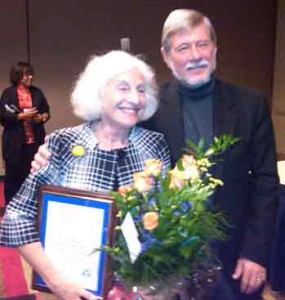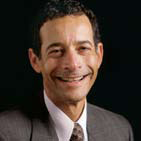November seems to be the month for awards. In particular, the Gerontological Society of America (GSA) recognizes a number of excellent clinicians and researchers every year at their annual meeting. We are pleased to wrap up our recent (informal) series on Hartford-funded awardees by highlighting the recipients of two more awards, presented at the GSA meeting this past weekend (November 18-22) in Atlanta, GA.

The 2009 GSA Doris Schwartz Gerontological Nursing Research Award was presented to Mathy Mezey, EdD, RN, FAAN, Professor Emerita, Senior Research Scientist and Director, The Hartford Institute for Geriatric Nursing, New York University College of Nursing. The award, presented by the Health Sciences section, recognizes outstanding and sustained contribution to geriatric nursing research. Mathy Mezey, a longtime Hartford grantee, received the award in recognition for her outstanding contribution to geriatric nursing research across all settings, particularly in education and long-term care. Her acceptance address, entitled “50 Years: Older Adults and Geriatric Nursing,” explored changes in geriatric nursing practice over the last five decades.
 Turning our attention from nursing to medicine, this year’s GSA meeting also featured the 2009 Joseph T. Freeman Award, a distinguished lectureship in geriatrics given annually to a prominent physician in the field of aging. This year’s award went to long-time Foundation grantee Stephanie Studenski, MD, MPH, at the University of Pittsburgh. Dr. Studenski is one of the nation’s foremost authorities and researchers of mobility, balance disorders, and falls in older adults (ask her about Dance, Dance, Revolution and older adults!). She is a professor in the Division of Geriatric Medicine at the University of Pittsburgh School of Medicine, co-director of the university’s John A. Hartford Center of Excellence in Geriatric Medicine and Training, and director of its Claude D. Pepper Older Americans Independence Center. (For more background on Dr. Studenski, click here.)
Turning our attention from nursing to medicine, this year’s GSA meeting also featured the 2009 Joseph T. Freeman Award, a distinguished lectureship in geriatrics given annually to a prominent physician in the field of aging. This year’s award went to long-time Foundation grantee Stephanie Studenski, MD, MPH, at the University of Pittsburgh. Dr. Studenski is one of the nation’s foremost authorities and researchers of mobility, balance disorders, and falls in older adults (ask her about Dance, Dance, Revolution and older adults!). She is a professor in the Division of Geriatric Medicine at the University of Pittsburgh School of Medicine, co-director of the university’s John A. Hartford Center of Excellence in Geriatric Medicine and Training, and director of its Claude D. Pepper Older Americans Independence Center. (For more background on Dr. Studenski, click here.)
Dr. Studenski will deliver her lecture at next year’s meeting. This year’s Freeman lecturer—2008 winner David Reuben, MD (UCLA)—is also a  long-time Foundation grantee. Dr. Reuben is Archstone Professor of Geriatric Medicine at UCLA’s David Geffen School of Medicine, director of the Multi-Campus Program in Geriatric Medicine and Gerontology, and director of UCLA’s John A. Hartford Center of Excellence in Geriatric Medicine and Training. (For more information about the foundation’s Center of Excellence program, see our 2005 Annual Report.)
long-time Foundation grantee. Dr. Reuben is Archstone Professor of Geriatric Medicine at UCLA’s David Geffen School of Medicine, director of the Multi-Campus Program in Geriatric Medicine and Gerontology, and director of UCLA’s John A. Hartford Center of Excellence in Geriatric Medicine and Training. (For more information about the foundation’s Center of Excellence program, see our 2005 Annual Report.)
In his talk, Dr. Reuben described his program of research aimed at improving the quality of primary care for older adults, including improved assessment techniques for older patients and MD-nurse practitioner collaborative practice models. He emphasized that the lack of financial incentives for quality remains a powerful stumbling block to broad impact. Finally, he focused on four broad conclusions:
- Health care providers have insufficient cognitive capacity to make optimal decisions every time. They need help, whether it comes from improved IT, system design, or delegation.
- There is not enough time available for providers to deliver the kind of care they'd really like to deliver.
- Our health care system is not a system. ANY system will likely be better than the non-system we have.
- Incentives and reward structures are woefully misaligned with practice parameters.
The Foundation congratulates Drs. Studenski and Mezey for their awards, as well as Dr. Reuben for his fine speech at the GSA meeting. Their work and their dedication to improving health care for older adults make them more than deserving of such honors.
Credit: Gavin Hougham also contributed to this essay.
